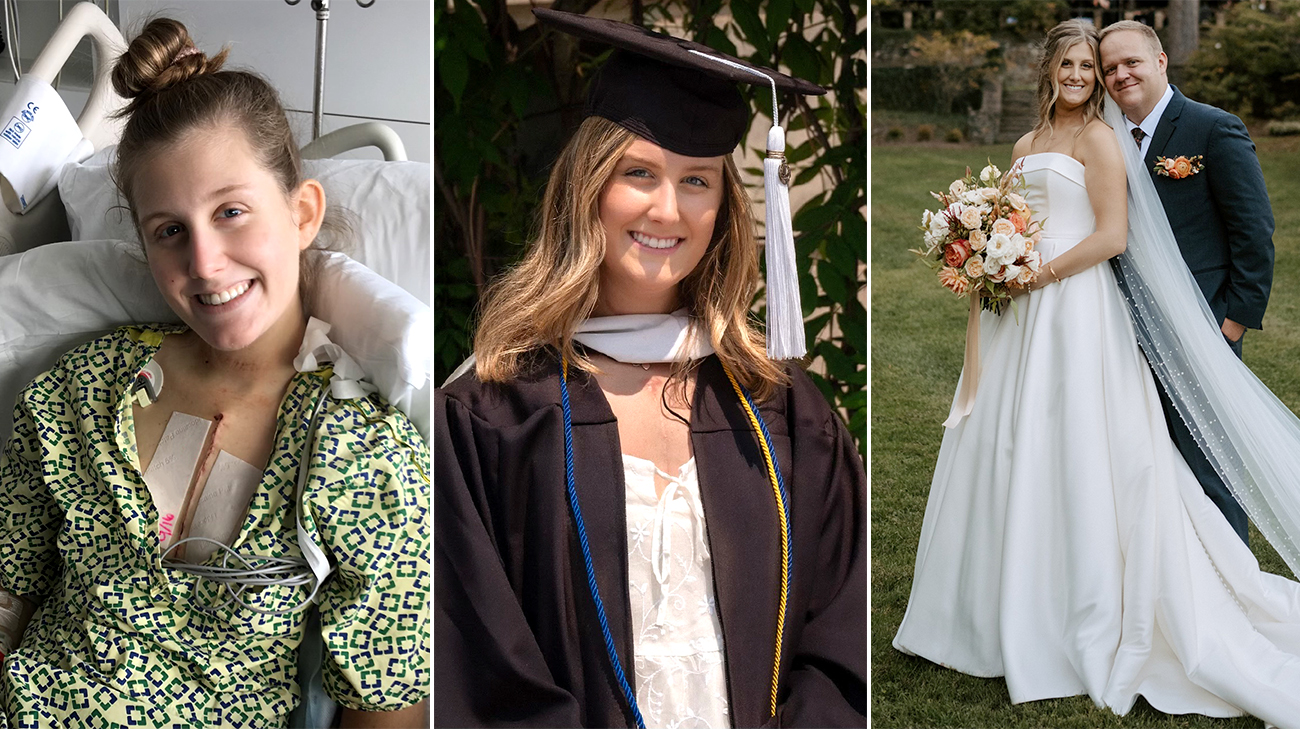
After working on her graduate school application from a hospital ICU bed, 25-year-old Molly Easly went on to get her bachelor’s and master’s degrees at the same time. Her resilience made this accomplishment possible even amid an aortic dissection and cancer diagnosis.
“After being told I’m a walking miracle, I understand I’m lucky to be alive and I’m still here for a reason. I want to be a light for others and give hope to those going through a similar experience,” says Molly of Chagrin Falls, Ohio.
Ever since she was young, Molly’s heart was monitored because of the history of aortic dissections in her family. An aortic dissection is a tear in the inner layer of a weak area of the aorta, which is the main artery that delivers oxygen-rich blood to the body. This can impact blood flow, or the aorta may rupture completely. It’s a life-threatening condition that requires immediate care, so Molly began seeing pediatric cardiologist Kenneth Zahka, MD, at Cleveland Clinic Children’s.
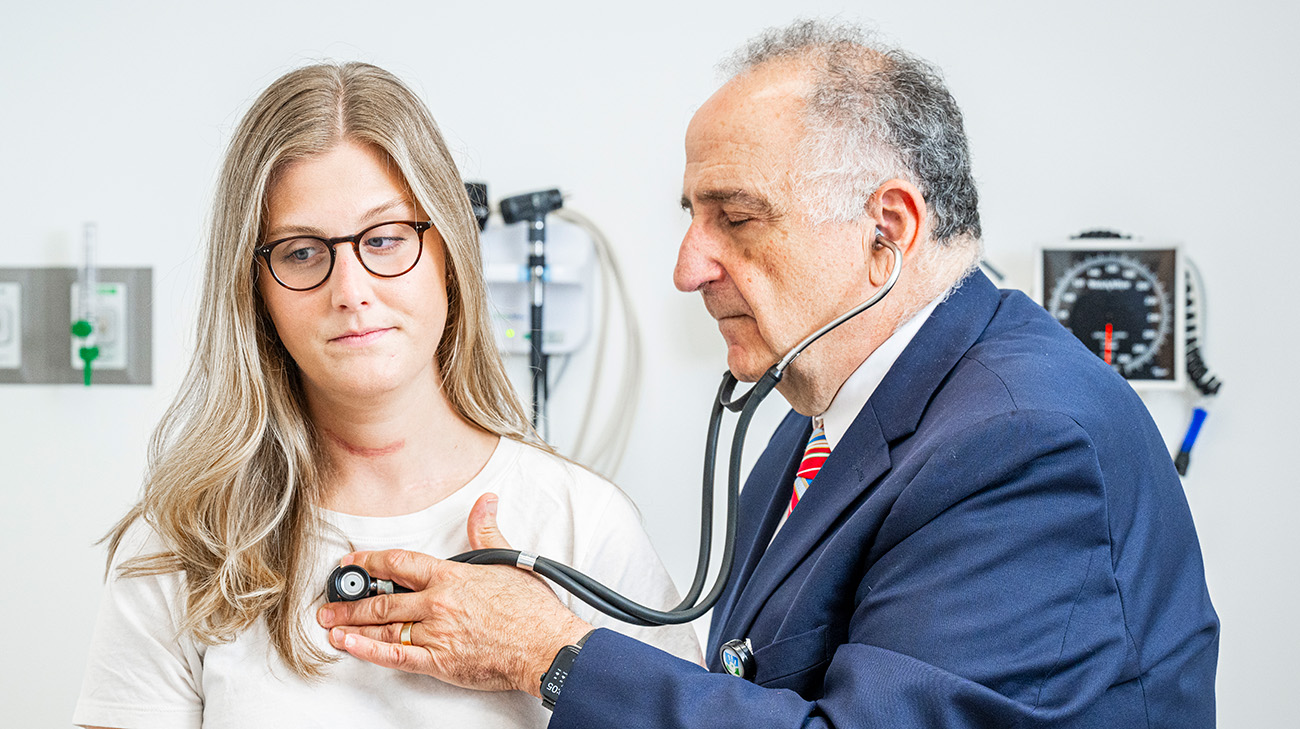
Molly with Dr. Kenneth Zahka at a follow-up appointment. (Courtesy: Cleveland Clinic)
“When I initially evaluated Molly, her above average size aorta with her family history was a marker even before we had the benefit of positive genetic testing,” says Dr. Zahka, who adds testing later confirmed Molly has an ACTA2 mutation, which increases a person’s risk of aortic aneurysms and dissections.
From there, Molly regularly followed up with Dr. Zahka and his team, which included Nicole Rush, CNP. They closely watched for warning signs of a potential dissection by looking for any changes with her aorta over time.
“During an appointment before she left for college, we noticed an abrupt increase in the size of her aorta,” says Dr. Zahka. “Given her family history, I had to be particularly careful with Molly to identify signs indicating she needed surgery to protect her from aortic dissection.”
Dr. Zahka was concerned with this change and referred her to cardiothoracic surgeon Eric Roselli, MD, who decided to move forward with surgery to address her dilated aorta. It was September 2017, and instead of starting her freshman year of college, she underwent her first heart surgery at 18 years old. Dr. Roselli explains he performed a valve-sparing aortic root replacement.
“We were able to save Molly’s valve while replacing her root and ascending aorta to prevent her from having what we call a Type A dissection, or a dissection of the first part of the aorta, which is a serious, life-threatening emergency. We also replaced her arch to prepare for later potential aortic problems,” says Dr. Roselli.
After a brief stay in the hospital, Molly came home to start what would be a lengthy recovery process. Determined to get her energy levels back up, she underwent cardiac rehab at Cleveland Clinic Hillcrest Hospital and celebrated each small milestone – whether it be walking up the stairs without getting winded or making it to the mailbox. She was also able to start college in 2018.
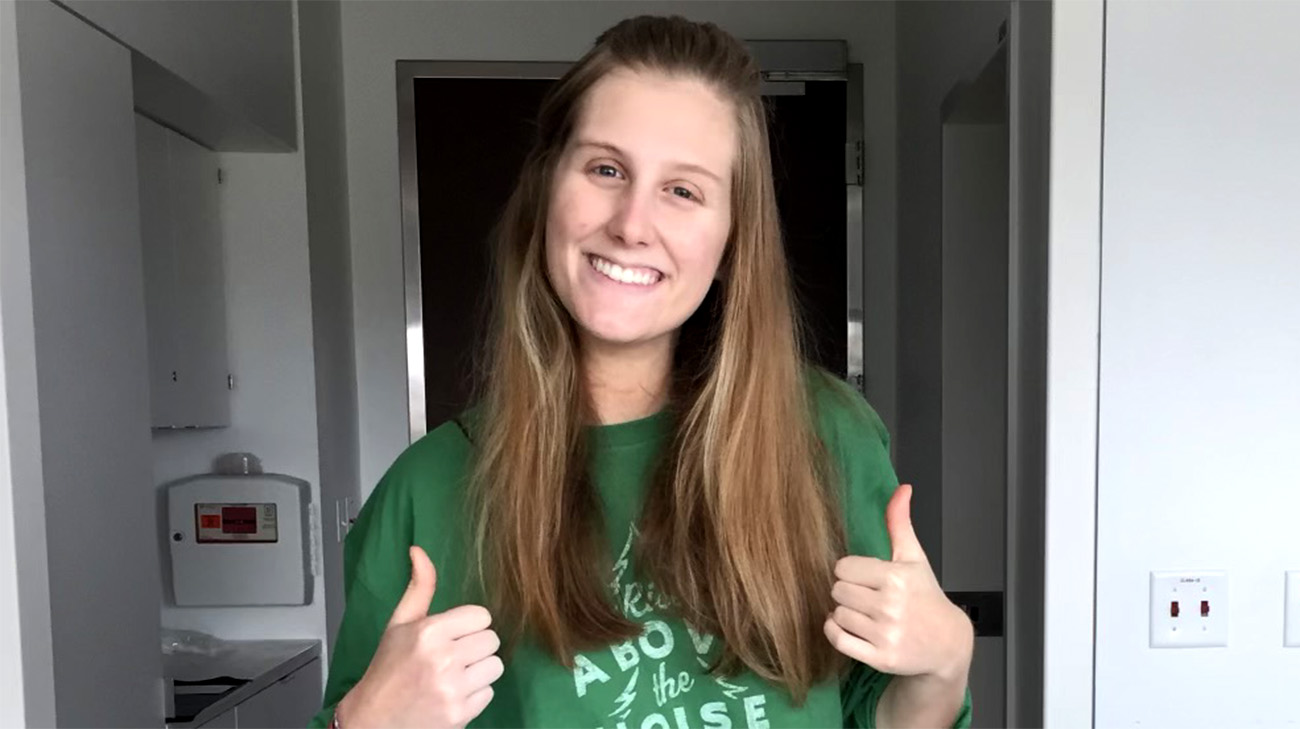
Molly the day she was discharged after her first heart surgery in 2017. (Courtesy: Molly Easly)
As she regained her strength, Molly’s care team continued regularly monitoring her for any changes with her aorta. She thought everything was back to normal up until a little over three years after her first surgery. It was January 2021, and she started feeling dizzy and couldn’t catch her breath. She recalls feeling a soreness in her chest as well.
“It almost felt like there was pressure in my chest,” says Molly. “Something just felt off to me, and in a way, I had this impending sense of doom.”
These symptoms brought Molly to Cleveland Clinic main campus in Cleveland, Ohio, where testing revealed she had an aortic dissection in her descending aorta or a Type B dissection, which is typically less dangerous than a Type A dissection. However, it still needs addressed promptly.
“Because I did that more extended repair a few years prior, we were able to better control her condition in the intensive care unit and then get her treated with a minimally invasive operation,” says Dr. Roselli. He explains the team was able to use a stent graft – a synthetic fabric tube with metal wire stents for support – to reline and reinforce the weak area of the aorta.
“Molly got through all this because we were aggressive with her treatment, and even though she had an emergency situation with the dissection, we were ready for it,” says Dr. Roselli.
While addressing the dissection, Molly’s care team also spotted a nodule on her thyroid which further testing confirmed was thyroid cancer. On the heels of her dissection, she now had to undergo surgery to remove her thyroid as well as radioactive iodine therapy. While juggling both oncology and cardiology appointments, she didn’t let that stop her from accomplishing her goals. In May 2023, she graduated from college.
“I got my master’s in developmental psychology and early intervention. Eventually, I would love to be in a clinical setting helping kids with cardiac conditions,” says Molly. “I understand how being in a hospital and having all these appointments can profoundly impact your development.”
Currently, Molly has no evidence of cancer and continues to follow up with her cardiologists. She’s thankful to her care team, who she says has allowed her to maintain an active lifestyle and continue enjoying her hobbies, like riding horses.
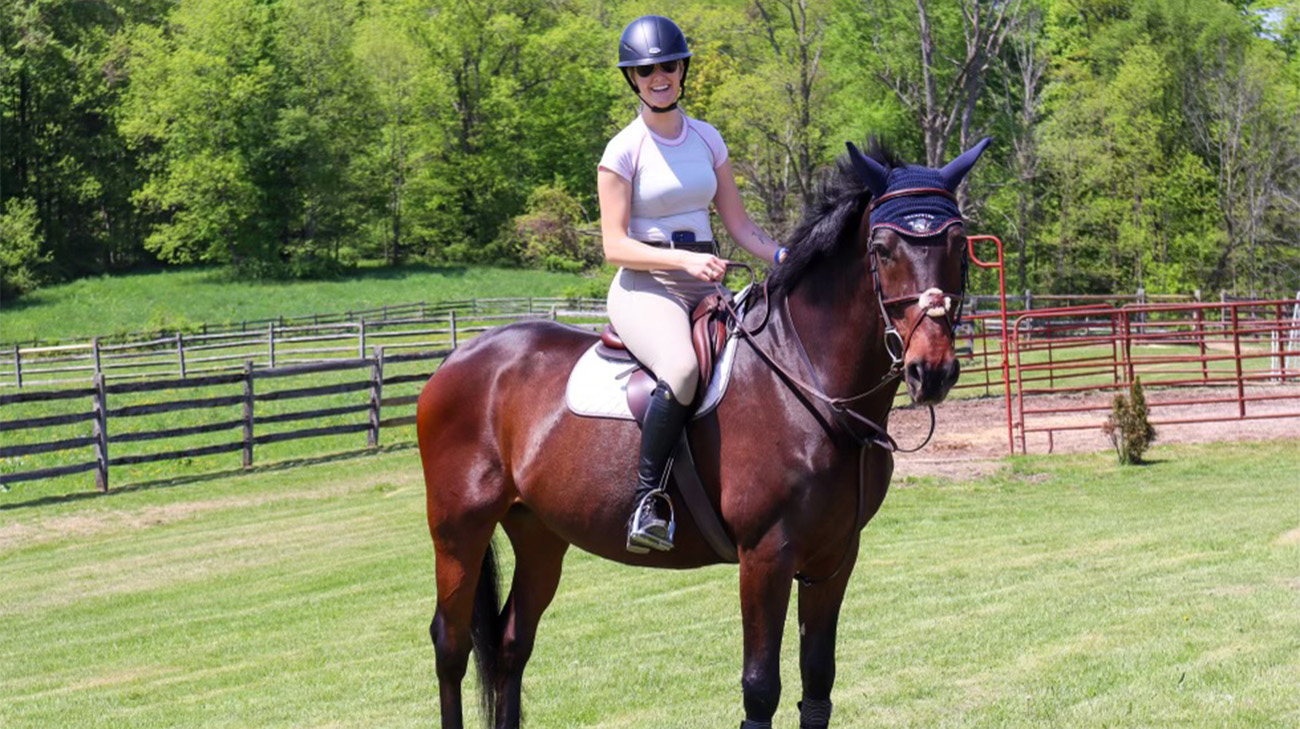
One of Molly’s escapes is riding horses. Her care team worked with her so she could keep up with her hobbies as much as possible. (Courtesy: Molly Easly)
“Riding horses has always been my escape. My doctors understand this and work with me so I can continue doing it,” says Molly. “They know what's important to me, and it's really nice they're willing to work as a team so I can still engage in my hobbies and accomplish my goals.”
Dr. Zahka adds, “We work with patients to find that sweet spot, where they can still do the things they love while managing their condition. We're certainly better at not limiting them to the same extent we had in the past.”
Molly further credits her care team with saving her life and being able to go on to meet her husband, Briggs Krause. In fact, Briggs has a connection to one of her doctors. As they got to know each other more, Molly learned he’s also a patient of Dr. Zahka’s.
“After finding out we have the same cardiologist, I brought him with me to one of my appointments,” says Molly. “The look on Dr. Zahka’s face when he saw Briggs and me was absolutely priceless. He’s like, ‘Wait a minute. Who am I here for?’”
“I thought, ‘What are the chances?’ I mean, I’m a busy guy, but this is unbelievable,” laughs Dr. Zahka.
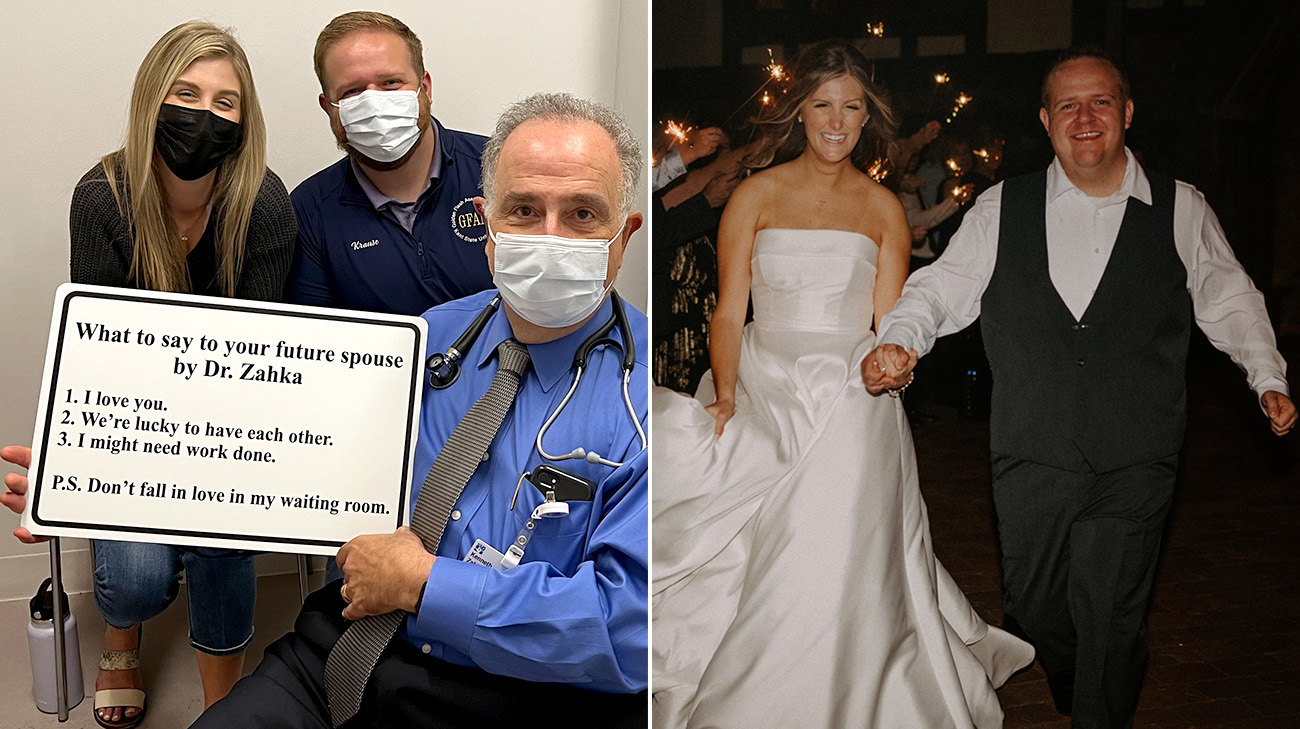
Molly with her husband, Briggs Krause, when she took him to see Dr. Zahka.(left) (Courtesy: Molly Easly) Molly and Briggs at their wedding in October 2024.(right) (Courtesy: Aileen Elizabeth Photography)
Molly adds it’s nice to have met someone who’s familiar with the kind of health journey she’s gone through, and in October 2024, Molly and Briggs said, “I do.” She now looks forward to this next chapter in her life and creating new memories with Briggs. As Molly continues reaching new milestones, she hopes sharing her story will help others.
“At times, I felt so isolated when I was going through all this, and I want others in a similar situation to know they're not alone,” assures Molly.
Related Institutes: Heart, Vascular & Thoracic Institute (Miller Family), Cleveland Clinic Cancer Center

